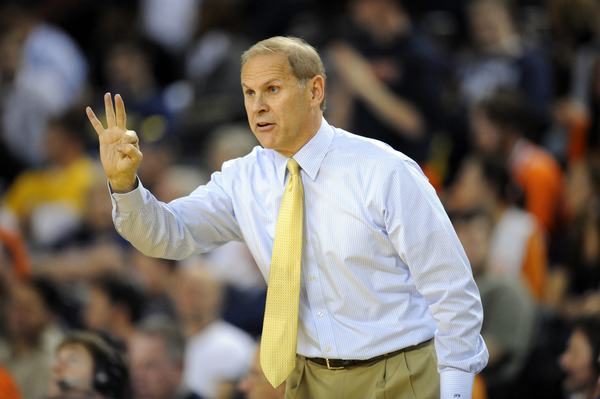John Beilein Continues to Prove Himself as a Players’ Coach
Posted by Deepak Jayanti (@dee_b1g) on April 3rd, 2014Before taking the Michigan job, John Beilein was known for running a fast-paced offense that can outscore anybody on a given night. His West Virginia team with Kevin Pittsnoggle and Mike Gansey surprised opposing defenses on its way to the Elite Eight in 2005. Based on his seven-year record in Ann Arbor, it is high time to recognize and appreciate his ability to coach players with diverse skill sets. Customizing the offense to accordingly cope with personnel turnover and injuries has been his forte in leading Michigan basketball back to relevance in the Big Ten and on the national stage.
There was no specific game or season that started this transformation, but if we were forced to pick one, we should review the last six weeks of the 2010-11 Big Ten season. After losing six straight games in January, the Wolverines appeared to have only a slight shot of making the NCAA Tournament. But led by a sharpshooting freshman in Tim Hardaway Jr. and a relatively unknown point guard named Darius Morris, Beilein’s crew made a furious charge into the Big Dance and nearly upset Duke in the round of 32. That season showed how Beilein could string together young players to mesh with seasoned veterans like Stu Douglass and Zach Novak, slowly changing the culture of the long-dormant Michigan program.
Unexpectedly losing Morris to the NBA didn’t help the resurgence, but Beilein was able to immediately recognize incoming freshman Trey Burke’s talent and adjust the offense around him. Rather than letting Hardaway shoot the team to a win (or loss), he groomed Burke into a confident point guard who immediately commanded the team’s respect. Asking veterans to follow a freshman’s lead is not an easy task, but the coach was able to do it in a relatively short period to bring the Wolverines into contention for the conference title. If you need more evidence about his ability to incorporate new talented personnel, look no further than how he was able to mix the Fresh Five into an offense that already centered around Burke and Hardaway Jr. the following season. For example, not many pundits expected Nik Stauskas to be effective right out of the gate, but Beilein recognized his strengths and built around them. Beilein also realized that Mitch McGary needed some time to get up to speed, so he didn’t push it; instead, he brought the freshman big man along slowly and it paid great dividends last March. Nowadays, if a coach recruits a top-20 player, he is expected to play him immediately and evaluate the results. But Beilein exhibited a tremendous amount of grit in building rosters in his own way.
If the last three seasons of success haven’t provided enough data points for skeptics, Beilein’s work with this season’s offense was nearly perfect. As soon as McGary went out indefinitely, Beilein’s proactive moves with his existing talent was masterful. He could have easily pushed Glenn Robinson to take a far greater role in the offense — but again exhibiting great patience — he didn’t force the sophomore into a situation that could have made him uncomfortable. Robinson seems most valuable as an effective third scorer on a team that feasts on defensive mismatches instead of in a role as the second best player. The same goes for Derrick Walton Jr. He just wasn’t ready to step up quite yet, so what did Beilein do? He went with his next available option and inserted Caris LeVert into the offensive sets — the rest is history.
There are only a handful of coaches in the country who can successfully adjust to the swings of a season and keep their teams together. In the Big Ten, Bo Ryan is another such example of a coach who looked at his bench and demanded they step up rather than dwelling on the roadblocks in front of them. For Beilein, if it wasn’t McGary, it was Stauskas. If it wasn’t Walton, it was LeVert. He has consistently responded to adversity with not just an effective answer, but a great answer — strategic moves that took Michigan one incredible shot away from consecutive Final Four appearances. His strategy is here to stay because if Stauskas returns for another season, the Wolverines should expect to be back in the Elite Eight and will be one of the favorites to make the Final Four, again.










































